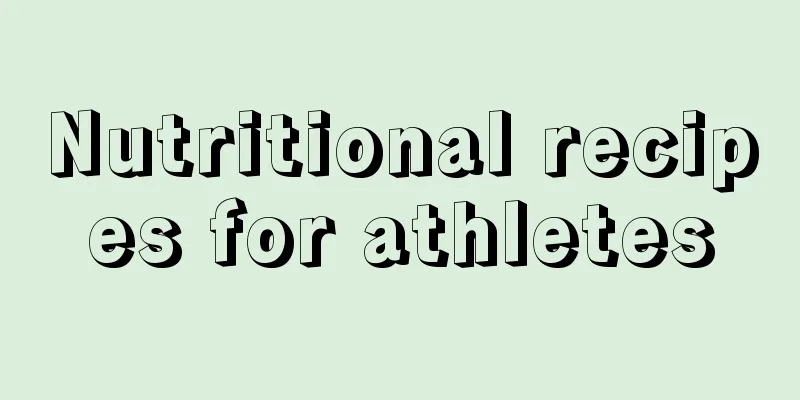Nutritional recipes for athletes

|
Athletes consume a lot of physical energy, especially during training, they can easily consume body energy. During this period, they can supplement nutrition through diet. Scientific and healthy supplements are needed to improve the physical fitness of Yundongyan. Generally, athletes consume energy faster, so they need to supplement more protein foods and eat more grains and beans. What is the nutritional diet for athletes? Athlete Diet Overview An athlete's athletic ability depends not only on scientific training, excellent physical and psychological qualities, but also on good health and reasonable nutrition. Reasonable nutrition is the material basis of sports training. It is conducive to the smooth progress of metabolic processes and the regulation of organ functions. It has a good effect on athletes' functional status, physical adaptation, post-exercise recovery and injury prevention and treatment, and helps athletes to give full play to the training effects and competitive abilities. Reasonable nutrition plus strict scientific training are the basic guarantee for achieving excellent athletic results. Nutritional principles 1. Energy demand: Athletes have high energy metabolism intensity during training and competition. The specific energy requirements depend mainly on the intensity, density and duration of exercise. An athlete's total daily energy consumption consists of four parts: basal metabolism, exercise consumption, thermogenesis of food and other activities. The energy supply standard for athletes in my country is 50-60 kcal/kg. 2. Protein intake provides sufficient high-quality protein, which is very helpful for replenishing athletes' consumption, increasing muscle strength, and accelerating recovery from fatigue. High-quality protein should account for more than 30% of the total protein intake, and should be consumed in the form of a mixture of cereals and legumes. The protein supply is 1.5 to 2.5 g/kg. 3. Fat intake Fat has high energy production and small volume, making it an ideal form of energy storage for athletes. In moderate-intensity exercise, energy consumption in a short period of time comes from fat and carbohydrates. Over an hour or longer, the utilization rate of fat energy gradually increases. In endurance exercise, fat can provide about 80% of the energy. Athletes should not consume too much fat in their diet because fat is difficult to digest and consumes a lot of oxygen during metabolism, which affects the oxygen supply. The daily fat content in the diet of Chinese athletes should be 25% to 30% of the total energy. 4. Carbohydrate intake: Carbohydrates are the most ideal source of energy for athletes. Because its molecular structure is simpler than protein and fat, it is easily absorbed by the body, consumes less oxygen during oxidation, and has high energy production efficiency. Appropriate intake of glucose before and during exercise helps maintain blood sugar levels during exercise. The carbohydrate supply for athletes should be 50-60% of total energy, and 65-70% for anaerobic sports. 5. Principles of fluid replacement Athletes should replenish fluids in a timely manner based on their personal physical condition, sports training or competition conditions and environmental factors, as well as previous experience. It is best to perform preventive fluid replacement before and during exercise to avoid dehydration and prevent a decline in exercise ability; replenish fluids in time after exercise to promote recovery. The principle of fluid replacement should be to take small amounts of fluids multiple times to avoid a large amount of fluid replacement at one time, which would increase the burden on the gastrointestinal tract and cardiovascular system. The total amount of fluid replacement must be greater than the total amount of water loss. Choose the right sports drink in moderation. 6. Intake of sodium, potassium and magnesium: Since sodium, potassium, magnesium and calcium play an important role in maintaining nerve information conduction and muscle contraction, athletes sweat a lot and the amount of sweat lost increases, so athletes' demand for sodium, potassium and magnesium is higher than that of ordinary people. The recommended daily intake of sodium, potassium and magnesium for Chinese athletes are: sodium <5g (<8g for training in high temperature environment), potassium 3-4g, and magnesium 400-500g. 7. Calcium, iron and zinc intake: Athletes have different calcium needs depending on the sport. The recommended daily calcium intake for Chinese athletes is 1000-1500 mg. For athletes who participate in high-intensity sports, the upper limit of calcium intake when training or competing in high-temperature environments may be considered, which is 1500 mg. Exercise speeds up the metabolism of iron and zinc, affecting their absorption and increasing their excretion. |
<<: Effective weight loss diet
Recommend
How to cook cured pork leg with green beans
Faced with so many delicious foods on the market ...
How to make Tanggao (July 7)
Unhealthy diet is a major cause of many diseases....
Refreshing cold noodles
As a seasoned foodie, you must be shocked every t...
How to make crab mushrooms with bean sprouts
If you are unmarried, are you wandering around al...
Passion Applesauce Recipe
An unhealthy diet can often be a triggering facto...
How to make curry butterfly noodles
Many people are the only child in their families,...
How to make shrimp and radish soup
As a seasoned foodie, you must be shocked every t...
How to make soy sauce wonton noodles
Dinner has always been an important meal of the d...
How to make pepper noodles
For many people, eating healthy is not easy. In f...
Refreshing cold bamboo shoots recipe
As people's living standards improve, they be...
Summer pasta recipe
For you who study and work hard every day, the gr...
How to make pea yellow with wolfberry
The method of cooking pea yellow with wolfberry i...
How to make cold fried dough sticks and cucumber
A healthy body requires us to maintain it in all ...
Garlic Spare Ribs
Everyone is a foodie. If not, it’s because you ha...
Lemon jellyfish head recipe
A beautiful and fulfilling childhood will inevita...









